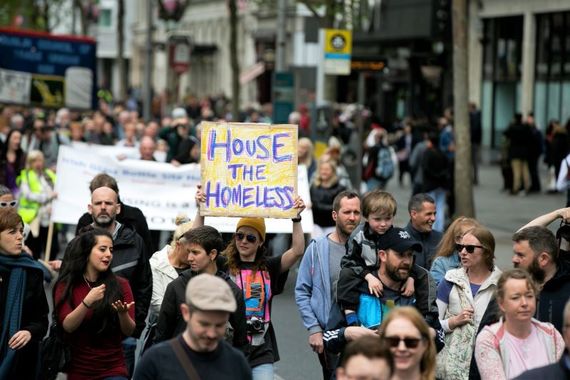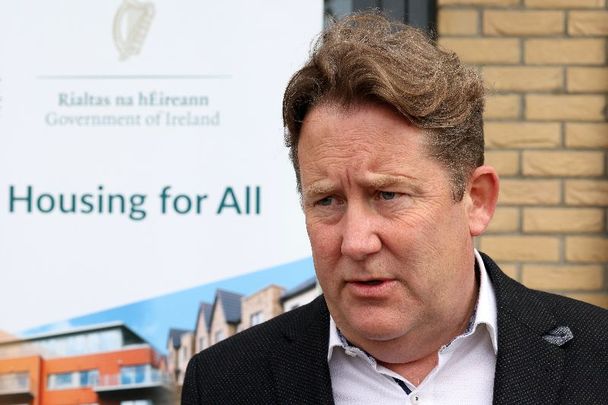Where will we live? It seems like such a simple question, but what if you live in the most expensive state in the European Union for housing costs, one that is now 94% above the EU average?
Irish rents jumped by 68% from 2010 to 2021, rising by just 16% across the wider EU in the same period. So what is going on and why does the country with the worst housing crisis in the EU have one of the lowest levels of investment in house building?
The answer to the first and second questions is that we have an economy that puts investment and the market before the fulfillment of citizens' needs. When compared to the wider EU, the Irish government's unrequited embrace of laissez-faire capitalism is more enthusiastic than just about anywhere in the EU bloc.

May 18, 2019: Protesters from Raise the Roof Housing Rally leaving from Parnell Square Dublin. (RollingNews.ie)
Our government has been busy investing €4.3 billion a year in commercial real estate in Ireland. Take a walk along Dublin's exploding financial district to see where it's going. Last year, the figure had grown to €6 billion.
Clearly, there is funding for ambitious new builds, but are they the right builds? Couldn't much of that 50 billion have been put to better use transforming our new home market, and help new homeowners find somewhere to live?
Why keep building a ballooning Potemkin village of commercial space (the take-up of office space in Dublin in the first quarter of 2023 has declined by 42% on the same period last year) when you have a clear and present market for residential ones?
The ideological answer is that market sees all and knows all. It can be trusted to provide whatever there is a demand for. But is the market really that far-seeing? Can it be trusted to provide for all without any input or direction?
We already know the answer. The experiment has failed. The game is instead heavily rigged in favor of the deepest pockets and their immediate interests. International property speculators now own over 45,000 homes across the Republic. When the government lifted the eviction ban that protected tenants since last October, they contributed further to the already record-breaking levels of homelessness.
So it has been obvious for years now that the market can not and will not meet the level of investment needed to address the lamentable crisis in housing, providing the shelter and the quality of life that intending Irish homeowners are increasingly desperate for. But tell that to the free market purists running our government. They prefer to scoff at the suggestion that they create a kind of Marshall Plan for home building, muttering about magic money trees and forgetting they only exist for investment in the commercial market.
Whilst for intending homeowners it's among the worst of times, for the investor funds, landlords, banks, developers, landowners, and the property industry, it's among the best. As they make out like bandits due to the property squeeze they are loathe to see any change to the current circumstances that juice the market to their ends.
Good luck asking the current government for the kind of vision and investment that's needed to solve the property crisis. That would mean ownership of a different kind – taking responsibility for the crisis and also for its solution, a thing that the current government has shown itself allergic to.
Instead, the government hopes you will do what generations have done before you, quietly accept the status quo or be beaten down by it and emigrate. Leaving the island is far preferable to them than staying and challenging their lack of commitment to you.
But if the current property situation and rental market squeeze in Ireland isn't a crisis, then what is? We don't throw Irish education, health, or basic social welfare to the tender mercies of the global market in Ireland, so why do we do it with the entire housing system?
The key problem is ideological, I believe. The current government, like the private developers, property asset managers, real estate investors, financial advisors, accountants, and banks, see property as an asset, a commodity, not a home.
They will not change their basic outlook about this until Irish voters force them to. That's why the national election ahead of us is the most important in our lifetimes. Remember, your vote is your voice. It's time they heard you.




Comments